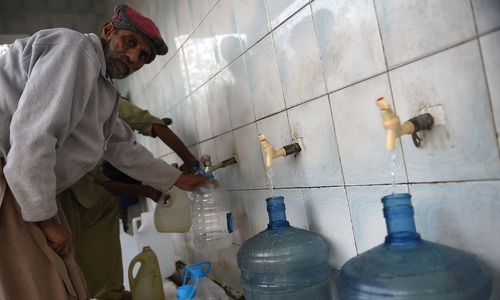ISLAMABAD: Water scarcity is an issue residents of the capital have been faced with for a long time, especially in summers.
Nonetheless, in the last three decades, no concrete measures have been taken by the Capital Development Authority (CDA) to explore new resources in order to meet the water requirement of the citizens. Background talks with relevant officers showed that in the 90s the CDA launched a project to bring water from Khanpur Dam. This was the last project which was executed when Islamabad’s population was almost 600,000. However, as per the census held in 2017, the population of the capital had increased to 2.2 million but water resources are still the same.
CDA officials said a small effort was made by the civic agency recently - the restoration of two million gallons daily (MGD) of water from Rawal Dam. But this is still not sufficient to meet the city’s water requirement.
“The issue of water shortage in Islamabad is a chronic one and it needs proper attention from the government. Every summer we see a shortage of water,” said Dawood Hussain, a resident of G-7.
In the summer, CDA releases water on alternate days and sometimes after three days, he added.
According to CDA officials, the current requirement for water in Islamabad’s urban and rural areas is 220 MGD. CDA provides up to 70 MGD mostly in urban areas through four major sources - Simly Dam, Khanpur Dam, tubewells and Rawal Dam. The city’s rural population depends on water bores, tubewells and a small water supply scheme launched by the district administration.
Work on three major projects that have been discussed since last 15 years is still pending, officials say
The issue of water shortage could be resolved with the help of the federal government as CDA can’t execute major projects such as Ghazi Barotha project, extension of Khanpur Dam and Chirrah Dam, the officials pointed out, adding these projects had been discussed since the last 15 years but there was no practical work being done still.
They said even if one of the projects was executed, water shortage in the city would come to an end.
The Ghazi Barotha project was designed to provide 100 MGD to Rawalpindi and Islamabad. Initially, the estimated cost of the project was Rs37 billion, which was re-estimated in 2017 at Rs77 billion and now the cost has climbed to Rs120 billion. The project saw only one small development last year when the federal government earmarked funds for land acquisition for pipeline network and feasibility study. While chairing a meeting, Planning Minister Asad Umar had said the mega project will be completed through public-private partnership. The federal government authorised CDA to engage Frontier Works Organisation (FWO) for this project.

CDA officials said through the extension of Khanpur Dam, Islamabad and Rawalpindi could collectively get 51 MGD whereas through the Chirrah Dam project, which is a joint venture of Punjab government and CDA, both cities could get 15 MGD.
The officials said that Punjab government was the executing agency of Chirrah Dam and after approval of the project from executive committee of National Economic Council a decade ago, the CDA paid Rs851.8 million to the Small Dam Organisation (SDO) in 2014, but still the project is a pipe dream. As per the initial PC-1, the cost of the project was Rs5.3 billion but in response to a letter of CDA, the executive engineer of SDO through a letter dated Nov 6, 2020 informed the authority that SDO intended to conduct a fresh feasibility study and revision of the construction cost is expected to be over Rs22 billion.
“We want execution of this project to provide 15 MGD water to residents of Rawalpindi and Islamabad. We are going to take up the issue of Chirrah Dam in the upcoming standing committee meeting,” Special Assistant to the Prime Minister on CDA Affairs Ali Nawaz Awan said.
Mr Awan, who chairs a subcommittee of the National Assembly Standing Committee on Water resources, told Dawn that the subcommittee will discuss all aspects of Chirrah Dam project such as reason for delay and the way forward.
Meanwhile, sources said during the feasibility study of Simly Dam in the 80s, a proposed Chiniot Dam had also come under discussion, but later no focus was paid towards the project. “
“I do agree, the project should have been launched decades ago to address the water needs of Islamabad, but no focus was paid to translate the announcement into reality,” said an officer of CDA.
When contacted, Deputy Director General (water supply) Sardar Khan Zimri said that the government and management of CDA had been making efforts to start the Ghazi Barotha project. He said the Chirrah Dam project and extension of Khanpur Dam were also under consideration. Currently, the CDA through various measures has overcome the water shortage issue, he said, adding earlier there were around 350 daily complaints but nowadays they have been reduced to 150. He said that 10 new water tankers had also been added to the fleet.
“We have repaired tubewells and also fixed many leaked lines,” he said, adding recently the CDA management approved Rs120 million for the repairs.
Meanwhile, a press release issued by CDA stated: “Upon the special directions of the CDA a helpline has been set up for protecting water from wastage. Citizens can report the leakage at any time. Inquiry offices for water tankers supply are functional in all the sectors, 25 water tankers are available for water supply to citizens. The number of tubewells has been increased to 155. Twenty-eight new filtration plants are being installed across the city.”
Published in Dawn, June 6th, 2021














































